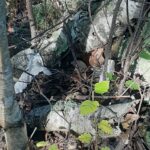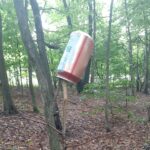What is Leave No Trace and why is it important?
Leave No Trace is a set of principles to guide your use of public lands as a visitor. Careful stewardship will ensure that these sacred spaces can continue to be enjoyed by not only future generations, but by next week's visitors as well.
Leave No Trace is not about the perfect actions of one person, but rather about the improved actions of a lot of people. You may not be perfect but you can always find ways to improve!
Below are some examples of problems we have observed while outdoors. The number one type of trash we see in the backcountry is toilet paper or wipes that are not properly buried or packed out. Don't make me clean up after you! Carry a small shovel to bury paper and excrement six inches.
To learn more visit the about Leave No Trace Center for Outdoor Ethics, www.LNT.org.
Stacie is a Certified Leave No Trace Instructor, available to offer Awareness Workshops. Speaking Engagements
The Leave No Trace Seven Principles
• Plan Ahead and Prepare
• Travel and Camp on Durable Surfaces
• Dispose of Waste Properly
• Leave What You Find
• Minimize Campfire Impacts
• Respect Wildlife
• Be Considerate of Other Visitors
© 1999 by the Leave No Trace Center for Outdoor
Ethics: www.LNT.org
Note from Stacie:
As part of my Leave No Trace Trainer certification course, I did a presentation online for Principle #1: Be Prepared. This video is a practice recording, discussing the importance of preparation for having a successful and fun outdoor adventure.





